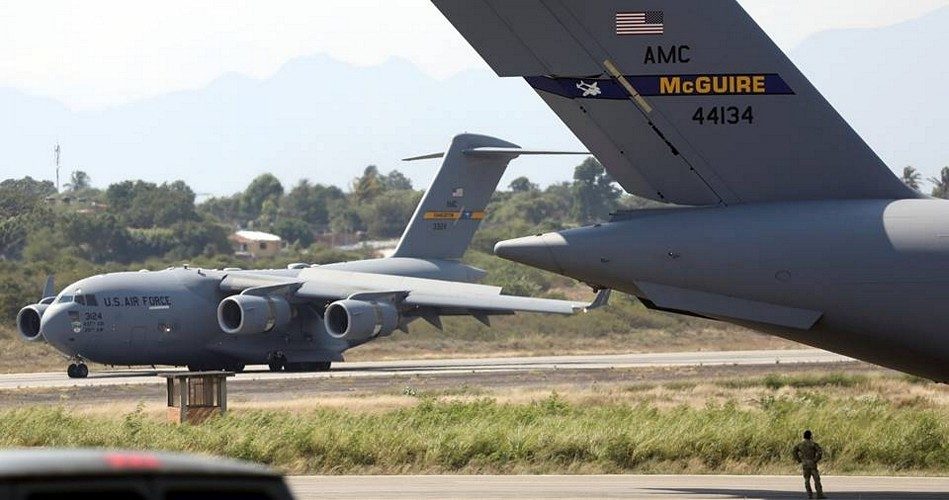
U.S. military cargo planes are delivering more than 240 metric tons of various supplies — medicine, nutritional supplements, personal hygiene supplies, toothpaste, bar soap and the like — to three locations close to Venezuela’s borders. It is being supplied by USAID (United States Agency for International Development), using a few millions of its $27 billion budget to put more pressure on Venezuela’s dictator, Nicolás Maduro. Maduro has declared that his military will stop any such aid from entering his country, claiming that it’s a Trojan Horse that is setting the stage for a military invasion by U.S. troops.
USAID administrator Mark Green admitted that the move is a gamble by the White House, and agreed that if Maduro’s military successfully prevents the supplies from reaching the existing network of soup kitchens for their dispersal to the locals, that “all options are on the table” to get them into the country.
This move, coordinated with Venezuela’s interim president Juan Guaidó, came just a day after the White House applied additional sanctions on more of Maduro’s top people. They included Maduro’s chief executive running Venezuela’s state-owned oil company, Manuel Quevedo, and five other top intelligence and security officials. Those sanctions block their access to any assets they might have stashed in the United States or its territories, prohibit their travel into the Unites States, and ban U.S. citizens from doing business with them.
The pressure on Maduro is increasing as Guaidó’s U.S. Ambassador Carlos Vecchio told the Wall Street Journal on Friday that the interim administration has already named a new board of directors for PdVSA, which will assume complete control of Maduro’s oil company within a week.
With all the pressure being applied by the United States, and by Maduro’s neighbors, who are calling for him to step down and hold “free, fair, and honest” elections for his replacement, one wonders why the dictator remains in control.
Florida Republican Senator Marco Rubio has contended that the only reason Maduro’s military hasn’t folded is because of Cuban infiltration: “They [Maduro’s military] are … loyal … because the Cubans are spying on them. The Cuban intelligence agencies quickly pick up … any of these military officers [who] are being disloyal or expressing doubts — and those guys are arrested.”
Because of Cuban infiltration, said Rubio, “There has been a massive purge of Venezuelan military officers over the last two years.… It wasn’t because of corruption.… It was because the Cubans caught them and reported them.”
That Cuban influence has been so pervasive that, according to the Miami Herald, the White House is considering putting Cuba back on its list of countries that sponsor terrorism. Cuba, it will be remembered, was removed from that list by the Obama administration in 2015 as part of its “opening” toward Cuba.
In a speech at the UN Security Council on January 26, U.S. Secretary of State Mike Pompeo said, “No regime has done more to sustain the nightmarish condition of the Venezuelan people than the regime in Havana [Cuba]. Cuban security and intelligence thugs, invited into Venezuela by Maduro himself … have sustained this illegitimate rule.… Cuba has directly made matters worse.”
U.S. Director of National Intelligence Dan Coats apparently hasn’t gotten the memo. Three days after Pompeo’s statement at the UN, Coats delivered a presentation before the Senate Intelligence Committee reviewing the “2019 Worldwide Threat Assessment” put together by U.S. intelligence agencies. In that 42-page presentation, all he had to say about Cuba was this:
Cuban President Miguel Diaz-Canel will adhere to former President Raul Castro’s blueprint for institutionalizing one-party rule and socialism in Cuba through constitutional reforms. Diaz-Canel has acknowledged that Raul Castro, who still commands the ruling Communist Party, remains the dominant voice on public policy.
Coats had another opportunity to expand on his remarks concerning Cuba’s intervention in support of Maduro’s Venezuela with the prepared remarks now available on his website. But no; instead his remarks focused on “what I would describe as the BIG 4 — China, Russia, North Korea and Iran — all of which pose unique threats to the United States and our partners.”
This may be true, but Cuba is supporting Venezuela, keeping in place the murderous Marxist dictator who has long since outlived his legal and moral tenure in that unhappy country.
Coats made passing reference to Cuba in his official remarks: “The Kremlin has aligned Russia with repressive regimes in Cuba, Iran, North Korea, Syria and Venezuela….
We expect that attempts by Cuba, Russia, and to some extent China, to prop up the Maduro regime’s security [with] financing will lead to additional efforts to exploit the situation [there] in exchange for access to Venezuelan oil.”
That’s it. Nothing about Cuba’s intervention and infiltration that is working to keep Maduro’s regime in power.
Photo: AP Images
An Ivy League graduate and former investment advisor, Bob is a regular contributor to The New American magazine, writing primarily on economics and politics. He can be reached at [email protected].
Related articles:
Venezuela’s Opposition Leader Guaidó Open to U.S. Intervention
Trump Says Military Intervention in Venezuela Is “An Option”



